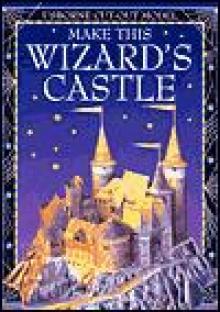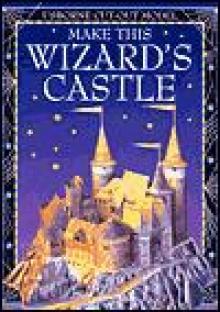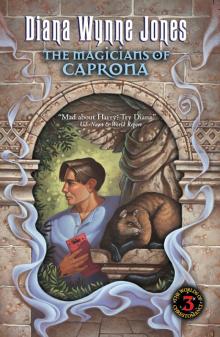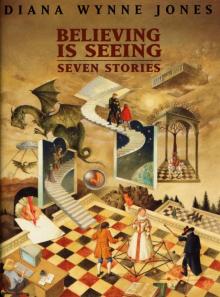- Home
- Diana Wynne Jones
Believing Is Seeing Page 2
Believing Is Seeing Read online
Page 2
Imperion put the sphere down in a wood and sped back to Theare, heartily relieved. There he reported what he had done to Zond, and all Heaven rejoiced. Imperion made sure that Nestara married a very rich man who gave her not only wealth and happiness but plenty of children to replace Thasper. Then, a little sadly, he went back to the ordered life of Heaven. The exquisite organization of Theare went on untroubled by Dissolution.
Seven years passed.
All that while Thasper knew nothing and remained three years old. Then, one day, the sphere of forgetfulness fell in two halves, and he blinked in sunlight somewhat less golden than he had known.
“So that’s what was causing all the disturbance,” a tall man murmured.
“Poor little soul!” said a lady.
There was a wood around Thasper, and people standing in it looking at him, but, as far as Thasper knew, nothing had happened since he soared to the middle region with his father. He went on with the question he had been in the middle of asking. “Why is the world round?” he said.
“Interesting question,” said the tall man. “The answer usually given is because the corners wore off spinning around the sun. But it could be designed to make us end where we began.”
“Sir, you’ll muddle him, talking like that,” said another lady. “He’s only little.”
“No, he’s interested,” said another man. “Look at him.”
Thasper was indeed interested. He approved of the tall man. He was a little puzzled about where he had come from, but he supposed the tall man must have been put there because he answered questions better than Imperion. He wondered where Imperion had got to. “Why aren’t you my dad?” he asked the tall man.
“Another most penetrating question,” said the tall man. “Because, as far as we can find out, your father lives in another world. Tell me your name.”
This was another point in the tall man’s favor. Thasper never answered questions; he only asked them. But this was a command. The tall man understood Thasper. “Thasper,” Thasper answered obediently.
“He’s sweet!” said the first lady. “I want to adopt him.” To which the other ladies gathered around most heartily agreed.
“Impossible,” said the tall man. His tone was mild as milk and rock firm. The ladies were reduced to begging to be able to look after Thasper for a day then. An hour. “No,” the tall man said mildly. “He must go back at once.” At which all the ladies cried out that Thasper might be in great danger in his own home. The tall man said, “I shall take care of that, of course.” Then he stretched out a hand and pulled Thasper up. “Come along, Thasper.”
As soon as Thasper was out of it, the two halves of the sphere vanished. One of the ladies took his other hand, and he was led away, first on a jiggly ride, which he much enjoyed, and then into a huge house, where there was a very perplexing room. In this room Thasper sat in a five-pointed star and pictures kept appearing around him. People kept shaking their heads. “No, not that world either.” The tall man answered all Thasper’s questions, and Thasper was too interested even to be annoyed when they would not allow him anything to eat.
“Why not?” he said.
“Because, just by being here, you are causing the world to jolt about,” the tall man explained. “If you put food inside you, food is a heavy part of this world, and it might jolt you to pieces.”
Soon after that a new picture appeared. Everyone said “Ah!” and the tall man said, “So it’s Theare!” He looked at Thasper in a surprised way. “You must have struck someone as disorderly,” he said. Then he looked at the picture again, in a lazy, careful kind of way. “No disorder,” he said. “No danger. Come with me.”
He took Thasper’s hand again and led him into the picture. As he did so, Thasper’s hair turned much darker. “A simple precaution,” the tall man murmured, a little apologetically, but Thasper did not even notice. He was not aware what color his hair had been to start with, and besides, he was taken up with surprise at how fast they were going. They whizzed into a city and stopped abruptly. It was a good house, just on the edge of a poorer district. “Here is someone who will do,” the tall man said, and he knocked at the door.
A sad-looking lady opened the door.
“I beg your pardon, madam,” said the tall man. “Have you by any chance lost a small boy?”
“Yes,” said the lady. “But this isn’t—” She blinked, “Yes, it is!” she cried out. “Oh, Thasper! How could you run off like that? Thank you so much, sir.” But the tall man had gone.
The lady’s name was Alina Altun, and she was so convinced that she was Thasper’s mother that Thasper was soon convinced, too. He settled in happily with her and her husband, who was a doctor, hardworking but not very rich. Thasper soon forgot the tall man, Imperion, and Nestara. Sometimes it did puzzle him—and his new mother, too—that when she showed him off to her friends, she always felt bound to say, “This is Badien, but we always call him Thasper.” Thanks to the tall man, none of them ever knew that the real Badien had wandered away the day Thasper came, and fell in the river, where an invisible dragon ate him.
If Thasper had remembered the tall man, he might also have wondered why his arrival seemed to start Dr. Altun on the road to prosperity. The people in the poorer district nearby suddenly discovered what a good doctor Dr. Altun was, and how little he charged. Alina was shortly able to afford to send Thasper to a very good school, where Thasper often exasperated his teachers by his many questions. He had, as his new mother often proudly said, a most inquiring mind. Although he learned quicker than most the Ten First Lessons and the Nine Graces of Childhood, his teachers were nevertheless often annoyed enough to snap, “Oh, go and ask an invisible dragon!” which is what people in Theare often said when they thought they were being pestered.
Thasper did, with difficulty, gradually cure himself of his habit of never answering questions. But he always preferred asking to answering. At home he asked questions all the time: “Why does the kitchen god go and report to Heaven once a year? Is it so I can steal biscuits? Why are there invisible dragons? Is there a god for everything? Why is there a god for everything? If the gods make people ill, how can Dad cure them? Why must I have a baby brother or sister?”
Alina Altun was a good mother. She most diligently answered all these questions, including the last. She told Thasper how babies were made, ending her account with, “Then, if the gods bless my womb, a baby will come.” She was a devout person.
“I don’t want you to be blessed!” Thasper said, resorting to a statement, which he only did when he was strongly moved.
He seemed to have no choice in the matter. By the time he was ten years old, the gods had thought fit to bless him with two brothers and two sisters. In Thasper’s opinion, they were, as blessings, very low grade. They were just too young to be any use. “Why can’t they be the same age as me?” he demanded, many times. He began to bear the gods a small but definite grudge about this.
Dr. Altun continued to prosper, and his earnings more than kept pace with his family. Alina employed a nursemaid, a cook, and a number of rather impermanent houseboys. It was one of these houseboys who, when Thasper was eleven, shyly presented Thasper with a folded square of paper. Wondering, Thasper unfolded it. It gave him a curious feeling to touch, as if the paper was vibrating a little in his fingers. It also gave out a very strong warning that he was not to mention it to anybody. It said:
Dear Thasper,
Your situation is an odd one. Make sure that you call me at the moment when you come face to face with yourself. I shall be watching and I will come at once.
Yrs,
Chrestomanci
Since Thasper by now had not the slightest recollection of his early life, this letter puzzled him extremely. He knew he was not supposed to tell anyone about it, but he also knew that this did not include the houseboy. With the letter in his hand, he hurried after the houseboy to the kitchen.
He was stopped at the head of the kitchen stairs by a trem
endous smashing of china from below. This was followed immediately by the cook’s voice raised in nonstop abuse. Thasper knew it was no good trying to go into the kitchen. The houseboy—who went by the odd name of Cat—was in the process of getting fired, like all the other houseboys before him. He had better go and wait for Cat outside the back door. Thasper looked at the letter in his hand. As he did so, his fingers tingled. The letter vanished.
“It’s gone!” he exclaimed, showing by this statement how astonished he was. He never could account for what he did next. Instead of going to wait for the houseboy, he ran to the living room, intending to tell his mother about it, in spite of the warning. “Do you know what?” he began. He had invented this meaningless question so that he could tell people things and still make it into an inquiry. “Do you know what?” Alina looked up. Thasper, though he fully intended to tell her about the mysterious letter, found himself saying, “The cook’s just sacked the new houseboy.”
“Oh, bother!” said Alina. “I shall have to find another one now.”
Annoyed with himself, Thasper tried to tell her again. “Do you know what? I’m surprised the cook doesn’t sack the kitchen god, too.”
“Hush, dear. Don’t talk about the gods that way!” said the devout lady.
By this time the houseboy had left and Thasper lost the urge to tell anyone about the letter. It remained with him as his own personal exciting secret. He thought of it as the Letter from a Person Unknown. He sometimes whispered the strange name of the Person Unknown to himself when no one could hear. But nothing ever happened, even when he said the name out loud. He gave up doing that after a while. He had other things to think about. He became fascinated by Rules, Laws, and Systems.
Rules and Systems were an important part of the life of mankind in Theare. It stood to reason, with Heaven so well organized. People codified all behavior into things like the Seven Subtle Politenesses or the Hundred Roads to Godliness. Thasper had been taught these things from the time he was three years old. He was accustomed to hearing Alina argue the niceties of the Seventy-two Household Laws with her friends. Now Thasper suddenly discovered for himself that all Rules made a magnificent framework for one’s mind to clamber about in. He made lists of rules, and refinements on rules, and possible ways of doing the opposite of what the rules said while still keeping the rules. He invented new codes of rules. He filled books and made charts. He invented games with huge and complicated rules and played them with his friends. Onlookers found these games both rough and muddled, but Thasper and his friends reveled in them. The best moment in any game was when somebody stopped playing and shouted, “I’ve thought of a new rule!”
This obsession with rules lasted until Thasper was fifteen. He was walking home from school one day, thinking over a list of rules for Twenty Fashionable Hairstyles. From this it will be seen that Thasper was noticing girls, though none of the girls had so far seemed to notice him. And he was thinking which girl should wear which hairstyle when his attention was caught by words chalked on a wall:
IF RULES MAKE A FRAMEWORK FOR THE MIND TO CLIMB ABOUT IN, WHY SHOULD THE MIND NOT CLIMB RIGHT OUT? SAYS THE SAGE OF DISSOLUTION.
That same day, there was consternation again in Heaven. Zond summoned all the high gods to his throne. “The Sage of Dissolution has started to preach,” he announced direfully. “Imperion, I thought you got rid of him.”
“I thought I did,” Imperion said. He was even more appalled than Zond. If the Sage had started to preach, it meant that Imperion had got rid of Thasper and deprived himself of Nestara quite unnecessarily. “I must have been mistaken,” he admitted.
Here Ock spoke up, steaming gently. “Father Zond,” he said, “may I respectfully suggest that you deal with the Sage yourself, so that there will be no mistake this time?”
“That was just what I was about to suggest,” Zond said gratefully. “Are you all agreed?”
All the gods agreed. They were too used to order to do otherwise.
As for Thasper, he was staring at the chalked words, shivering to the soles of his sandals. What was this? Who was using his own private thoughts about rules? Who was this Sage of Dissolution? Thasper was ashamed. He, who was so good at asking questions, had never thought of asking this one. Why should one’s mind not climb right out of the rules, after all?
He went home and asked his parents about the Sage of Dissolution. He fully expected them to know. He was quite agitated when they did not. But they had a neighbor, who sent Thasper to another neighbor, who had a friend, who, when Thasper finally found his house, said he had heard that the Sage was a clever young man who made a living by mocking the gods.
The next day someone had washed the words off. But the day after that a badly printed poster appeared on the same wall.
THE SAGE OF DISSOLUTION ASKS BY WHOSE ORDER IS ORDER ANYWAY?? COME TO SMALL UNCTION SUBLIME CONCERT HALL TONIGHT 6:30.
At 6:20 Thasper was having supper. At 6:24 he made up his mind and left the table. At 6:32 he arrived panting at Small Unction Hall. It proved to be a small shabby building quite near where he lived. Nobody was there. As far as Thasper could gather from the grumpy caretaker, the meeting had been the night before. Thasper turned away, deeply disappointed. Who ordered the order was a question he now longed to know the answer to. It was deep. He had a notion that the man who called himself the Sage of Dissolution was truly brilliant.
By way of feeding his own disappointment, he went to school the next day by a route which took him past the Small Unction Concert Hall. It had burned down in the night. There were only blackened brick walls left. When he got to school, a number of people were talking about it. They said it had burst into flames just before seven the night before.
“Did you know,” Thasper said, “that the Sage of Dissolution was there the day before yesterday?”
That was how he discovered he was not the only one interested in the Sage. Half his class were admirers of Dissolution. That, too, was when the girls deigned to notice him. “He’s amazing about the gods,” one girl told him. “No one ever asked questions like that before.” Most of the class, however, girls and boys alike, only knew a little more than Thasper, and most of what they knew was secondhand. But a boy showed him a carefully cut-out newspaper article in which a well-known scholar discussed what he called “the so-called Doctrine of Dissolution.” It said, long-windedly, that the Sage and his followers were rude to the gods and against all the rules. It did not tell Thasper much, but it was something. He saw, rather ruefully, that his obsession with rules had been quite wrongheaded and had, into the bargain, caused him to fall behind the rest of his class in learning of this wonderful new doctrine. He became a Disciple of Dissolution on the spot. He joined the rest of his class in finding out all they could about the Sage. He went around with them, writing up on walls:
DISSOLUTION RULES OK.
For a long while after that, the only thing any of Thasper’s class could learn of the Sage were scraps of questions chalked on walls and quickly rubbed out.
WHAT NEED OF PRAYER? WHY SHOULD THERE BE A HUNDRED ROADS TO GODLINESS, NOT MORE OR LESS? DO WE CLIMB ANYWHERE ON THE STEPS TO HEAVEN? WHAT IS PERFECTION: A PROCESS OR A STATE? WHEN WE CLIMB TO PERFECTION, IS THIS A MATTER FOR THE GODS?
Thasper obsessively wrote all these sayings down. He was obsessed again, he admitted, but this time it was in a new way. He was thinking, thinking. At first he thought simply of clever questions to ask the Sage. He strained to find questions no one had asked before. But in the process his mind seemed to loosen, and shortly he was thinking of how the Sage might answer his questions. He considered order and rules and Heaven, and it came to him that there was a reason behind all the brilliant questions the Sage asked. He felt light-headed with thinking.
The reason behind the Sage’s questions came to him the morning he was shaving for the first time. He thought, The gods need human beings in order to be gods! Blinded with this revelation, Thasper stared into the mirror at his own face half covered
with white foam. Without humans believing in them, gods were nothing! The order of Heaven, the rules and codes of earth, were all only there because of people! It was transcendent. As Thasper stared, the letter from the Unknown came into his mind. “Is this being face to face with myself?” he said. But he was not sure. And he became sure that when that time came, he would not have to wonder.
Then it came to him that the Unknown Chrestomanci was almost certainly the Sage himself. He was thrilled. The Sage was taking a special mysterious interest in one teenage boy, Thasper Altun. The vanishing letter exactly fitted the elusive Sage.
The Sage continued elusive. The next firm news of him was a newspaper report of the Celestial Gallery’s being struck by lightning. The roof of the building collapsed, said the report, “only seconds after the young man known as the Sage of Dissolution had delivered another of his anguished and self-doubting homilies and left the building with his disciples.”
“He’s not self-doubting,” Thasper said to himself. “He knows about the gods. If I know, then he certainly does.”
He and his classmates went on a pilgrimage to the ruined gallery. It was a better building than Small Unction Hall. It seemed the Sage was going up in the world.
Then there was enormous excitement. One of the girls found a small advertisement in a paper. The Sage was to deliver another lecture, in the huge Kingdom of Splendor Hall. He had gone up in the world again. Thasper and his friends dressed in their best and went there in a body. But it seemed as if the time for the lecture had been printed wrong. The lecture was just over. People were streaming away from the hall, looking disappointed.

 Fire and Hemlock
Fire and Hemlock Reflections: On the Magic of Writing
Reflections: On the Magic of Writing The Game
The Game The Crown of Dalemark
The Crown of Dalemark Deep Secret
Deep Secret Witch Week
Witch Week Year of the Griffin
Year of the Griffin Wild Robert
Wild Robert Earwig and the Witch
Earwig and the Witch Witch's Business
Witch's Business Dogsbody
Dogsbody Caribbean Cruising
Caribbean Cruising Cart and Cwidder
Cart and Cwidder Conrad's Fate
Conrad's Fate Howl's Moving Castle
Howl's Moving Castle The Spellcoats
The Spellcoats The Pinhoe Egg
The Pinhoe Egg Drowned Ammet
Drowned Ammet The Ogre Downstairs
The Ogre Downstairs Dark Lord of Derkholm
Dark Lord of Derkholm Castle in the Air
Castle in the Air The Magicians of Caprona
The Magicians of Caprona A Tale of Time City
A Tale of Time City The Lives of Christopher Chant
The Lives of Christopher Chant The Magicians of Caprona (UK)
The Magicians of Caprona (UK) Eight Days of Luke
Eight Days of Luke Conrad's Fate (UK)
Conrad's Fate (UK) A Sudden Wild Magic
A Sudden Wild Magic Mixed Magics (UK)
Mixed Magics (UK) House of Many Ways
House of Many Ways Witch Week (UK)
Witch Week (UK) The Homeward Bounders
The Homeward Bounders The Merlin Conspiracy
The Merlin Conspiracy The Pinhoe Egg (UK)
The Pinhoe Egg (UK) The Time of the Ghost
The Time of the Ghost Hexwood
Hexwood Enchanted Glass
Enchanted Glass The Crown of Dalemark (UK)
The Crown of Dalemark (UK) Power of Three
Power of Three Charmed Life (UK)
Charmed Life (UK) Black Maria
Black Maria The Islands of Chaldea
The Islands of Chaldea Cart and Cwidder (UK)
Cart and Cwidder (UK) Drowned Ammet (UK)
Drowned Ammet (UK) Charmed Life
Charmed Life The Spellcoats (UK)
The Spellcoats (UK) Believing Is Seeing
Believing Is Seeing Samantha's Diary
Samantha's Diary Aunt Maria
Aunt Maria Vile Visitors
Vile Visitors Stopping for a Spell
Stopping for a Spell Freaky Families
Freaky Families Unexpected Magic
Unexpected Magic Reflections
Reflections Enna Hittms
Enna Hittms Mixed Magics: Four Tales of Chrestomanci
Mixed Magics: Four Tales of Chrestomanci